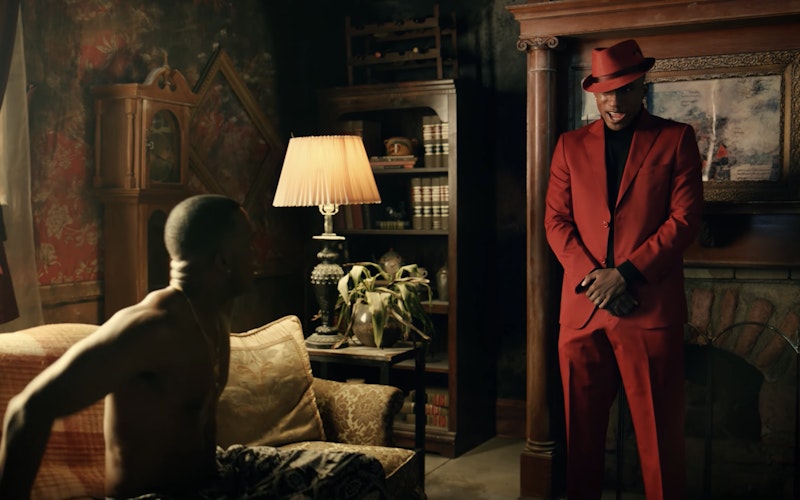
Music
Hopsin and Mental Health
Even though we live in a time where social media allows us to hear millions of different voices, our own voice can still create the loudest noise. We may overcompensate and think that isolation will bring us peace, only to find that our own thoughts torment us. Hopsin’s music video for his new single, “Alone With Me,” dramatizes just this sort of mental battle, of self vs. self, in a way that’s akin to the spiritual battle Paul describes in Romans 7.
The video begins in the place where most people find themselves overwhelmed by their thoughts: their bedroom. The irregular cadence of a windup music box serves as the melody until a more rhythmic beat signals the appearance of Hopsin’s inner thoughts. This “other” Hopsin is dressed in a suave colored suit and has an eerily calm demeanor compared to the confused Hopsin, who has been stirred awake in his bed. When the alter ego says “I’ve been with you since a teen, f***ing you up mentally,” he’s following the pattern that many of our thoughts take—building rapport while simultaneously tearing us down. People wrestle with certain thoughts for so long that they start to identify with them, even if those thoughts are destructive.
However, Hopsin seems to wrestle with whether or not these thoughts are truly his. In the chorus he questions himself (“f***s wrong with me”), while the camera angles visually mirror his mental distress. Instead of keeping Hopsin centered in the frame, the camera jerkily shifts focus while also panning back and forth erratically. His thoughts continue to wear him down by reminding him of his failed romantic relationships, his inability to find peace, and his insecurities towards his own music career. In a scene reminiscent of Eminem’s autobiographical film, 8 Mile, Hopsin finds himself in a rap battle with his thoughts. He stares at the crowd in disbelief while his thoughts mockingly tell him to “put the mic down don’t you fight this fight / Cause you the corny rapper only weird white kids like.”
After making him question his self-worth, Hopsin’s relentless thoughts inevitably lead him to question whether suicide is the answer. How often have our own thoughts left us feeling hopeless and empty? Causing us to fixate on the negative parts of our lives and on circumstances that are beyond our control? Hopsin says that “it couldn’t be clearer/ the man inside the mirror” is the one causing him angst. But how do we take authority in a fight against ourselves?
How often have our own thoughts left us feeling hopeless and empty?
In 2 Corinthians 10, Paul defends his apostolic authority to those within the Corinthian church. He notes how his boldness to provide constructive criticism was given first and foremost through Christ; he then acknowledges his carnal nature and the need to walk in humility through Christ as well. Because of his humility to submit to Christ, Paul was able to share in Christ’s authority to wage war against carnal thoughts. Likewise, we too can “take captive every thought to make it obedient to Christ” if we first submit ourselves to Christ’s governance over our lives.
But this doesn’t mean that we will no longer have spiritual or mental struggles. Elsewhere, in Romans 7, Paul notes that although he has the desire to do what is right, he “cannot carry it out. For I do not do the good I want to do, but the evil I do not want to do—this I keep on doing.” Hopsin also acknowledges the duality in his thoughts (“wait, hold up / Stop controlling me / I don’t know who I’m supposed to be”). While those of us who have submitted to Christ have the Holy Spirit living within us, we still wrestle with our old carnal nature. Yielding to the law of Christ means having the humility to confess that we do not have the power to help ourselves. We then are able to exercise boldness and seek help, both from God directly and in the assistance he provides through others.
Hopsin’s video ends with words of meditation from the mystic and yogi Sadhguru, who suggests that the power to overcome depression lies within ourselves and that we need only dismiss our thoughts as inconsequential ideas. If only it were that simple. The beauty of the gospel is that it relieves us from the pressure of pursuing such mental perfection. Having been freed in Christ, we should seek help where we can find it—from both mental-health professionals and the fellowship of believers—while also putting our ultimate trust in a savior who intimately knew the physical and mental anguish of the human experience. Then we, like Paul, can “take captive every thought to make it obedient to Christ,” even when we're alone with ourselves.
Topics: Music